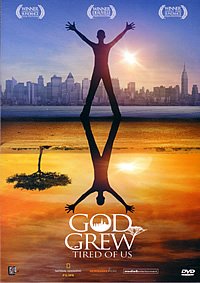SYNOPSIS:
Orphaned by a tumultuous civil war and travelling barefoot across
the sub-Saharan desert, three young Southern Sudanese, John
Bul Dau, Daniel Abol Pach and Panther Blor were among the 25,000
"Lost Boys" who fled to Ethiopia. Thousands died from
starvation, dehydration, bomb raids and genocidal murder until
they reached Kenya's Kakuma refugee camp, where 3,600 lost boys,
including John, Daniel and Panther, were invited to live in
America.They uprooted their lives and embark on a journey once
again, and must now learn to adapt to the economically intense
culture of the United States, learning new customs, adapting
to strange food, coping with jobs, while dedicating themselves
to help those in Kakuma, and to discovering the fate of their
family.
MOVIE REVIEW:
There is a scene in this 2006 documentary which struck
me how much we have taken things for granted. It’s a
seemingly simple scene: Some African men have just stepped
foot onto an escalator for the first time in their lives.
This is also the first time these men have stepped foot outside
their home country into a certain high and might country called
the U S of A. You see them struggle trying to set foot on
the moving escalator. Some fumble, some feel proud that they
don’t fall. You laugh at first, but feel ashamed doing
so a while later.
And
this excellent documentary is about these African men’s
journey into a land which promises so much more than their
war stricken homeland.
The
89 minute Sundance Film Festival Grand Jury Prize winner follows
three young men who are sent to America, well, by a stroke
of good fortune. You see, these men are out of the 25,000
boys who escaped to Ethiopia on foot after Sudan's Muslim
government pronounced death to all males in the Christian
south in 1987. Four years later, they were forced to flee
to Kenya, and only 12,000 survived. After these hardships,
our protagonists definitely deserve better. In America, these
men work several jobs, send money back home, search for relatives
lost in the civil war, adapt to the American and realize what
it means to miss home.
First,
the Christopher Dillon Quinn and Tommy Walker directed picture
intensifies your viewing with shocking archival footage of
Africa’s civil war. These shockingly brutal images may
be disturbing, but coupled with narrator Nicole Kidman’s
affecting voiceover, they seem so relevant and pertinent in
the society we take for granted today. One should take a moment,
especially people like me who have gotten used to the convenience
and comfort of technology (yes, typing this review on a wonderfully
wired computer makes me kind of guilty - kind of), to ponder
about how other people in other parts of the same world are
living drastically different lives.
From
history we move on to the protagonists’ journey to American
to realize their “American Dream”. We first see
the anticipation before setting off, we feel their hope for
better things to come, and we feel their family members’
joy too. But as they set foot into the commercialized world
where things like potato chips, toilet bowls and basic personal
hygiene are entirely new things to them, we can’t help
but feel blameworthy for chuckling at seeing those images
for the first time. We are sure that would be the same initial
reaction from many of you too.
But
the documentary would have worked If it set you thinking about
global issues, and when the picture progresses to shape the
protagonists into actual personalities that make up the basic
foundation of human nature, you’ll realize that we are
actually one big family living on the planet.
SPECIAL FEATURES :
This Code 3 DVD contains no bonus features.
AUDIO/VISUAL:
The disc’s
visual transfer isn’t anything spectacular, but that
shouldn’t stop you from watching this documentary. The
soundtrack is presented in African and English language.
MOVIE RATING:
    
DVD
RATING :

Review
by John Li
|


